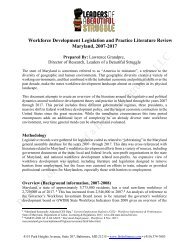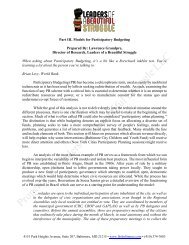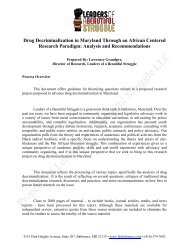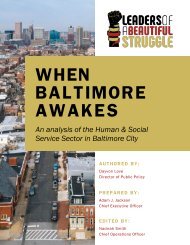The Communal Impacts of Drug Criminalization in Maryland
This project attempts to reframe the harms of drug criminalization. Influenced by African-Centered Research Methodologies, we engaged in a literature review and qualitative research of the communal impacts of drug decriminalization in Maryland, with a specific focus on Baltimore.
This project attempts to reframe the harms of drug criminalization. Influenced by African-Centered Research Methodologies, we engaged in a literature review and qualitative research of the communal impacts of drug decriminalization in Maryland, with a specific focus on Baltimore.
Create successful ePaper yourself
Turn your PDF publications into a flip-book with our unique Google optimized e-Paper software.
3. Decrim<strong>in</strong>alization does not recognize the values that ground communities’ responses to heal and<br />
be architects <strong>of</strong> their own solutions.<br />
1. <strong>Drug</strong> decrim<strong>in</strong>alization will not change the larger conditions faced by communities<br />
targeted by the War on <strong>Drug</strong>s.<br />
Interviewees rout<strong>in</strong>ely emphasized the need for a critical perspective that acknowledges the social impacts<br />
<strong>of</strong> addiction stemm<strong>in</strong>g from underly<strong>in</strong>g conditions <strong>in</strong> Baltimore. Contemporary discourse <strong>of</strong> decrim<br />
traditionally argues that addiction should be treated as a public health problem. A public health approach<br />
may be positive, as it seeks to address the material suffer<strong>in</strong>g caused by hyper-<strong>in</strong>carceration and addiction<br />
(24,78). However, it does not challenge the underly<strong>in</strong>g assumptions beh<strong>in</strong>d these systems <strong>of</strong> <strong>in</strong>equity and<br />
overlooks the productive capabilities <strong>of</strong> <strong>in</strong>dividuals who use and sell drugs as a means <strong>of</strong> survival and<br />
economic empowerment (6). Interviewees consistently po<strong>in</strong>ted out that the m<strong>in</strong>or revisions made to the<br />
crim<strong>in</strong>al legal system fail to address the true nature <strong>of</strong> the problem.<br />
One <strong>in</strong>terviewee, a youth leader, expressed concern that proposed marijuana legalization would<br />
exacerbate structural conditions generated by the War on <strong>Drug</strong>s.<br />
“If you are under the age <strong>of</strong> 18, and get caught with it, it’s still a crime. And the problem is what<br />
we know is <strong>in</strong> poor communities, like Black people's communities traditionally, there's a huge<br />
and urgent need for additional streams <strong>of</strong> <strong>in</strong>come. And there's a pretty well-documented history<br />
<strong>of</strong> kids tak<strong>in</strong>g up that type <strong>of</strong> ownership over contributions to the household space. Aga<strong>in</strong>, if you<br />
are a kid with no formal tra<strong>in</strong><strong>in</strong>g, no legitimate connections to larger money or politics or<br />
anyth<strong>in</strong>g else, you have what’s around you and available and so, traditionally, sell<strong>in</strong>g a little bit<br />
<strong>of</strong> weed is most people's <strong>in</strong>troduction <strong>in</strong>to be<strong>in</strong>g able to make money… there could be potentially<br />
a bunch <strong>of</strong> kids, who while this product is legal both medically and recreationally, because they<br />
are try<strong>in</strong>g to provide for their families <strong>in</strong> the same way that these White cannabis companies<br />
are, will cont<strong>in</strong>ue to be arrested, and cont<strong>in</strong>ue to be engaged <strong>in</strong> the juvenile justice system.”<br />
Not only did <strong>in</strong>terviewees express concern about the worsen<strong>in</strong>g <strong>of</strong> conditions <strong>in</strong> a post-decrim<strong>in</strong>alized<br />
Baltimore, but were clear that a communal and comprehensive response was sorely needed:<br />
“Let's not forget about the big bus<strong>in</strong>ess <strong>of</strong> the drug trade, right? It provides opportunities for<br />
primarily young Black men who are not gonna be a part <strong>of</strong> the so-called primary labor market.<br />
It gives them an opportunity to make money right, but it also obviously places them at risk to be<br />
<strong>in</strong>carcerated and murdered. So, this is k<strong>in</strong>d <strong>of</strong> a grand scheme. Like autopilot s<strong>in</strong>ce slavery, to<br />
cont<strong>in</strong>ue as a society to racially control certa<strong>in</strong> groups, and to essentially keep them subjugated<br />
and oppressed. Because ultimately...people don't want to give up their power and privilege.”<br />
(Jay)<br />
“<strong>The</strong> opportunities that vulnerable people have <strong>in</strong> the streets to make money is a way to also<br />
keep them cool and calm. But you take that opportunity to make money <strong>in</strong> the streets then<br />
people are go<strong>in</strong>g to become more desperate and if you don't have the services and the<br />
opportunities there, to rebuild and help the people, they will become more desperate, and they<br />
are not go<strong>in</strong>g to suffer peacefully. <strong>The</strong>y’re go<strong>in</strong>g to turn that anger <strong>in</strong>ward and outward, and I<br />
would say there would be more crime on the street. Now I’m not justify<strong>in</strong>g the sale <strong>of</strong> drugs <strong>in</strong><br />
any k<strong>in</strong>d <strong>of</strong> way... Tak<strong>in</strong>g the opportunity away from the streets, what money can you get? A<br />
group can become desperate. We need to th<strong>in</strong>k about this collectively.” (Jay)<br />
M<strong>in</strong>or amendments proposed by the current decrim<strong>in</strong>alization effort, such as re-conceptualiz<strong>in</strong>g levels <strong>of</strong><br />
thresholds <strong>of</strong> drug possession, may not address the issue <strong>in</strong> the eyes <strong>of</strong> communities that have<br />
experienced the devastat<strong>in</strong>g effects <strong>of</strong> crim<strong>in</strong>alization <strong>of</strong> drug possession. Interviewees expressed<br />
concerns that current decrim proposals do not resonate with the communities faced with high levels <strong>of</strong><br />
drugs on the street. In the absence <strong>of</strong> politically tangible solutions for community stabilization, some<br />
community members may f<strong>in</strong>d it easier to reconcile with the crim<strong>in</strong>al system <strong>of</strong> drug courts out <strong>of</strong> fear <strong>of</strong><br />
drug-related violence. So, <strong>in</strong>terviewees that raised such concerns warned about the fear <strong>of</strong> repackag<strong>in</strong>g<br />
crim<strong>in</strong>al reforms <strong>in</strong>to other forms <strong>of</strong> social oppression. For example, the <strong>in</strong>terviewee below shared<br />
apprehension <strong>of</strong> how the current approach will be received if they do not address structural conditions <strong>of</strong><br />
drugs, crime, and polic<strong>in</strong>g:<br />
36 <strong>of</strong> 55









